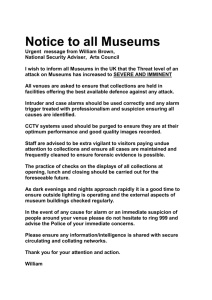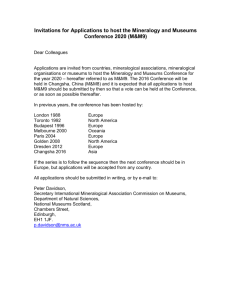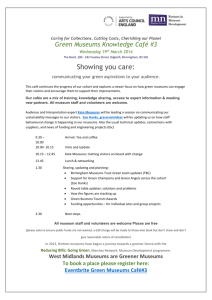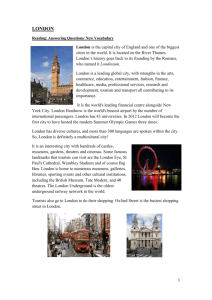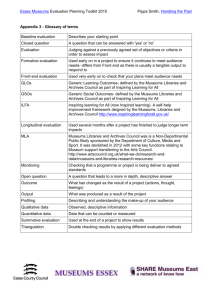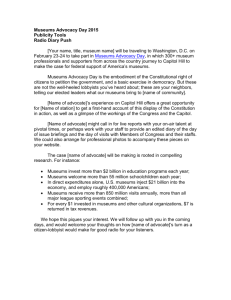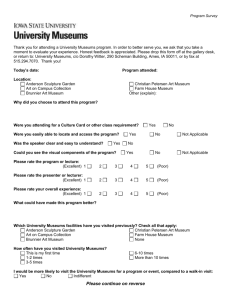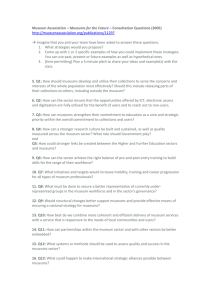40. CULT 406 NATION, HISTORY AND CULTURE IN MUSEUMS
advertisement
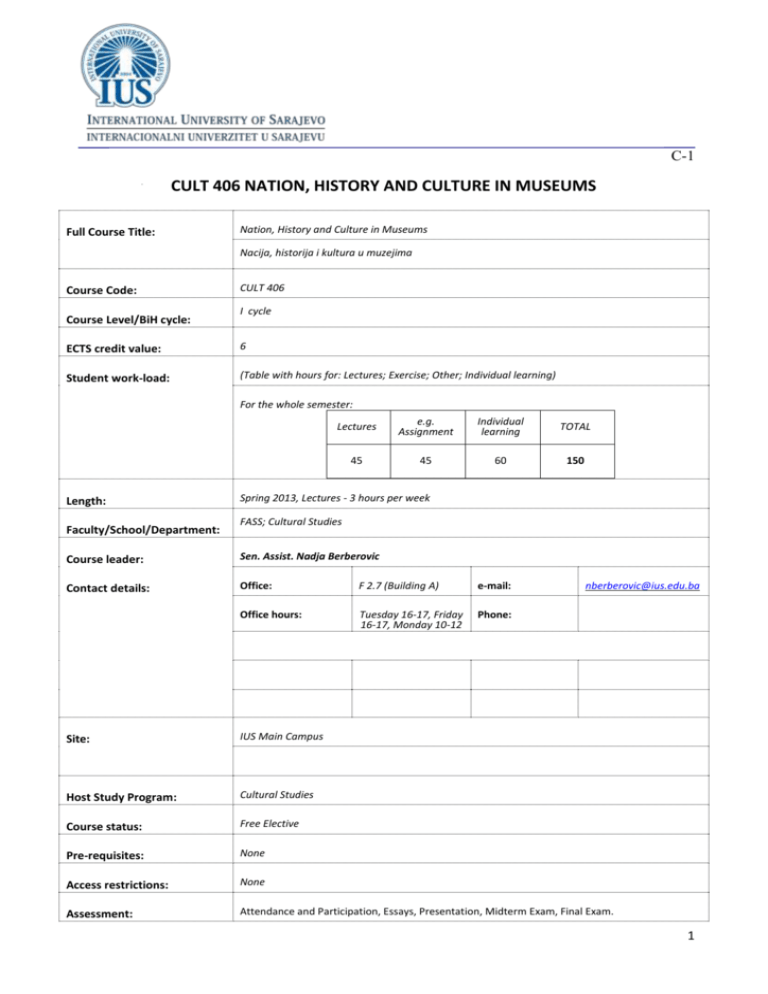
C-1 CULT 406 NATION, HISTORY AND CULTURE IN MUSEUMS Full Course Title: Nation, History and Culture in Museums Nacija, historija i kultura u muzejima Course Code: Course Level/BiH cycle: CULT 406 I cycle ECTS credit value: 6 Student work-load: (Table with hours for: Lectures; Exercise; Other; Individual learning) For the whole semester: Length: Faculty/School/Department: Lectures e.g. Assignment Individual learning TOTAL 45 45 60 150 Spring 2013, Lectures - 3 hours per week FASS; Cultural Studies Course leader: Sen. Assist. Nadja Berberovic Contact details: Office: F 2.7 (Building A) e-mail: Office hours: Tuesday 16-17, Friday 16-17, Monday 10-12 Phone: nberberovic@ius.edu.ba Site: IUS Main Campus Host Study Program: Cultural Studies Course status: Free Elective Pre-requisites: None Access restrictions: None Assessment: Attendance and Participation, Essays, Presentation, Midterm Exam, Final Exam. 1 C-1 Date validated: Course aims: Learning outcomes: Indicative syllabus content: April 2013 The aims of this course are to: 1. To introduce students to the cultural significance of museums, galleries and exhibitions 2. To offer students a materialist study of museums as media-forms 3. To develop students’ observation and analytical skills in regard to visual art 4. To deepen student’s understanding of the social, historical, and artistic aspects of museums as institutions 5. To develop academic communication skills, research skills and critical thinking On successful completion of this course IUS student will be able to: 1. Apply theoretical frameworks to the cultural study of museums 2. Critically assess the experiential and performative aspects of museums 3. Cultivate an appreciation for museums, galleries and exhibitions as media-forms 4. Relate the academic inquiry of museums to the study of visual arts, cultural and media studies This course will offer students the opportunity to embark on a fascinating investigation of the cultural significance of museums and exhibitions. The purview of the course spans from seventeenth-century innovations, the product of the first cabinets of ‘natural curiosities’ and ‘rarities’ gathered by merchants and explorers in the course of their great voyages of discovery, to the inflections of the ‘virtual museums’ engendered by the new media of today. The course will discern the basis for a materialist study of the museum as media-form, devoting particular attention to the communicative capacity of the museum so as to rethink assumptions about the ways in which they act as ‘sites for the classification and ordering of knowledge, the production of ideology, and the disciplining of the public.’ Interactive lectures, assignments, homework, field trips. Learning delivery: Assessment Rationale: Assessment Weighting: Essential Reading: Recommended readings: Students will develop a multiplicity of skills through various assignments, such as developing their reading and writing skills, communication and presentation skills as well as developing their critical and analytical skills. Attendance and participation 5% Essay 20% Midterm exam 25% Presentation 10% Final exam 40% 1. Michelle Henning. (2005). Museums, Media And Cultural Theory (Issues in Cultural and Media Studies). Open University Press. Additional/recommended reading: 1. Carol Duncan. (2005). Civilizing Rituals: Inside Public Art Museums. Routledge. 2. Gerard Corsane. (2005). Heritage, Museums and Galleries: An Introductory Reader. Routledge. Intranet web reference: Important notes: Course policy: Class absences should not exceed 20% of total class time. Students who exceed the limits without a medical certificate or emergency excuse acceptable to and approved by the Dean of the relevant faculty member shall not be allowed to take the final examination and shall receive a mark of N/A for the course. If the Dean approves the excuse, the student will be considered to have withdrawn from the course. Useful advice: Use office hours productively. Student responsibilities: To come to class on time. To be attentive and engaged in class. To refrain from using laptops, cell phones and other electronic devices during class. To spend an adequate amount of time on the homework each week, making an effort To solve and understand each problem. To seek help when appropriate. 2 C-1 Plagiarism: Zero Tolerance of Cheating & Plagiarism. Presentation of assignments: Your cover page must include: Your name, Essay title, Title of the subject, your lecture’s name, Date of submission Your paper: Font: Times New Roman, Size: 12, You must use 1.5 spacing, Include page numbers, Staple the pages together, Ensure that you use spell check and then check over your paper yourself again, Double check over your grammar and expression. You will use the in-text citations (MLA) for your referencing,You will NOT USE the following or similar websites in your academic writing: Wikipedia, Answers.com, Yahoo answers. Submitting your work - You must submit your work on time in class. Email your assignment to nberberovic@ius.edu.ba In the subject section of the email, you must include: Your name Course title Assessment type Quality Assurance: Students will be provided written feedback for each of the assignments. Students unsatisfied with the assessment of their written work (position paper and final essay) will have a chance to rewrite them and submit for second examination provided they met the deadlines. Students, who wish to increase the part of the grade coming from in-class participation, may be given additional tasks. Students are encouraged to consult their work in progress with the course leader during the office hours or through e-mail communication. Course schedule: 3 C-1 4
